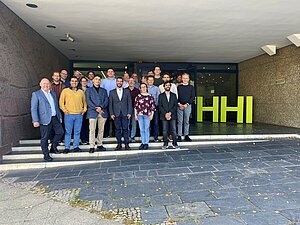October 24, 2022
September in Berlin. SPRINTER aims to become a key driver for advancing digital transformation. To achieve so, SPRINTER focuses on the diverse needs of industrial networks supporting time-critical networking in industry sectors. Another crucial topic on the agenda is providing a set of low-cost, energy-efficient, and ultra-dynamic optical transceivers in addition to optical switching solution. SPRINTER is funded with six million euros by the Horizon Europe program under the umbrella of the European Commission. The project will run from September 2022 until March 2027. Fraunhofer HHI receives a considerable share of 1.8 million euros from the overall budget.
The mission is clear: SPRINTER will develop state-of-the-art 200 Gb/s optical transceivers and ultra-fast wavelength-tunable 10 Gb/s optical transceivers. As a fundament, the project’s multidisciplinary team will combine the best-of-breed optical components from various powerful but complementary photonic integration platforms. In this context, Fraunhofer HHI’s Photonic Components (PC) department channels considerable expertise to SPRINTER. Five PC research groups – coordinated by Dr. David de Felipe Mesquida – pool their knowledge concerning electroabsorption-modulated lasers, photodiodes, modulators, and THz emitters. Importantly, Fraunhofer HHI’s hybrid photonic integration platform PolyBoard plays a decisive role in the project.
Dr. de Felipe Mesquida summarizes the overarching significance of Fraunhofer HHI’s involvement as follows: “In SPRINTER, we will develop hybrid photonic integrated circuits (PICs) that will enable low-latency communication networks and pave the way toward the fourth industrial revolution.” More in detail, the project will provide a reconfigurable optical add-drop multiplexer optimized for operation within space-division multiplexing networks. Such an emphasis leverages well-proven integration techniques that allow the fabrication of 3D PICs. Considering the complex and dynamic nature of industrial networks, SPRINTER will thus provide a set of groundbreaking photonics-enabled transceivers. The latter will support wireless connectivity using a free-space optical or a mmWave channel. Accordingly, the transceivers will operate reliably both in indoor and outdoor scenarios.
To conclude, SPRINTER intends to develop a unified network platform, providing the required methods and tools to support time-deterministic operation. Consequently, real-time communication with guaranteed service quality designates a top priority. Highlighting SPRINTER's full potential, the developed technology will be deployed in relevant industrial environments. This process simultaneously involves the incorporation of an operational closed-loop control system. Ultimately, the project’s goal is to significantly contribute to the innovative technological framework that advances Industry 4.0.
Next to Fraunhofer HHI, SPRINTER also comprises the following project partners: Institute of Communication and Computer Systems (EL), CSEM Centre Suisse d'Electronique et de Microtechnique SA - Recherche et Developpement (CH), LioniX International BV (NL), Interuniversitair Micro-Electronica Centrum (BE), Universidad Carlos III de Madrid (ES), PHIX Photonics Assembly (NL), Intracom SA Telecom Solutions (EL), Mellanox Technologies Ltd - MLNX (IL), Cumucore Oy (FI), Ericsson Telecomunicazioni S.p.A. (IT), Fill Gesellschaft mbH (AT).
